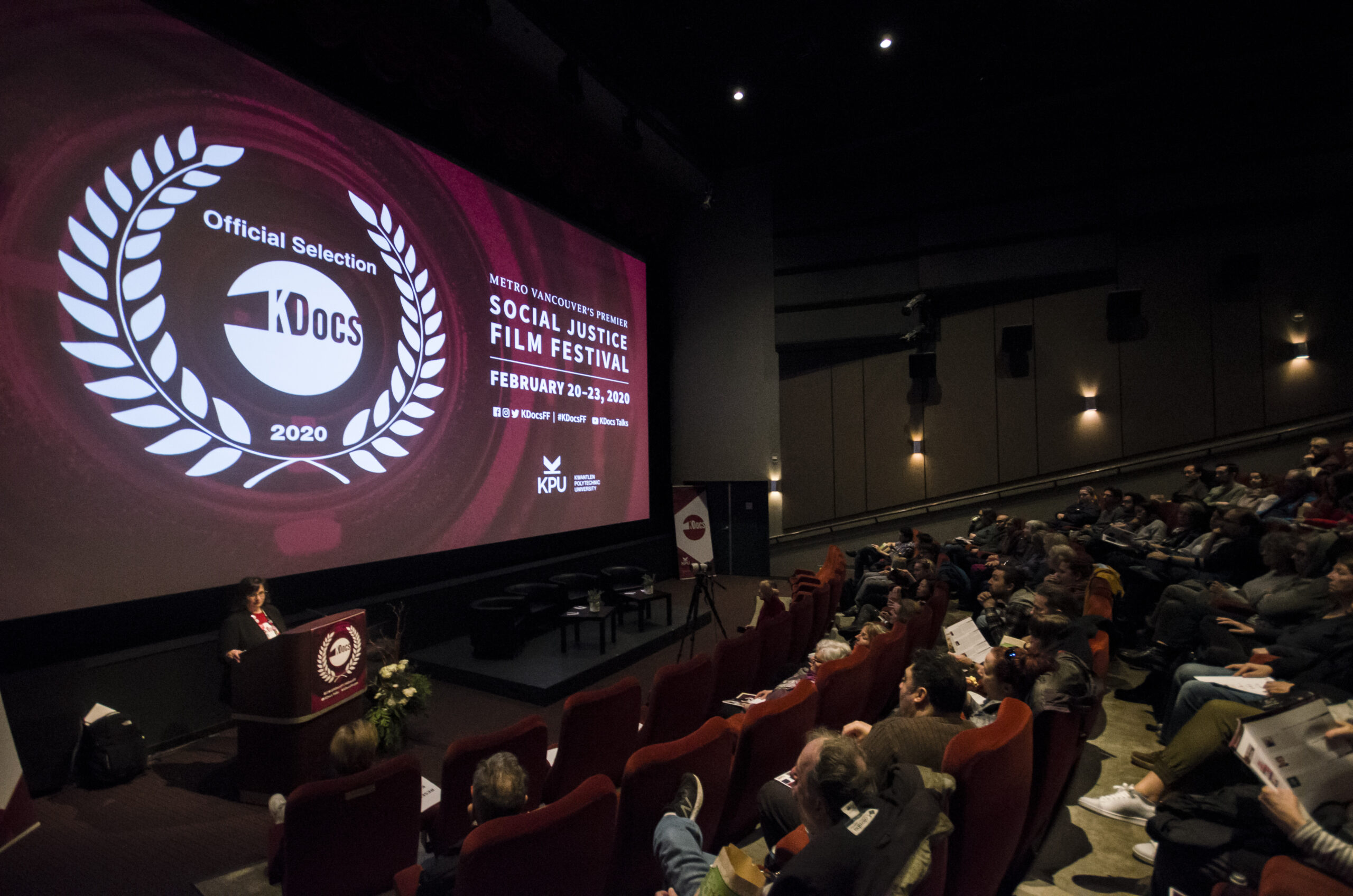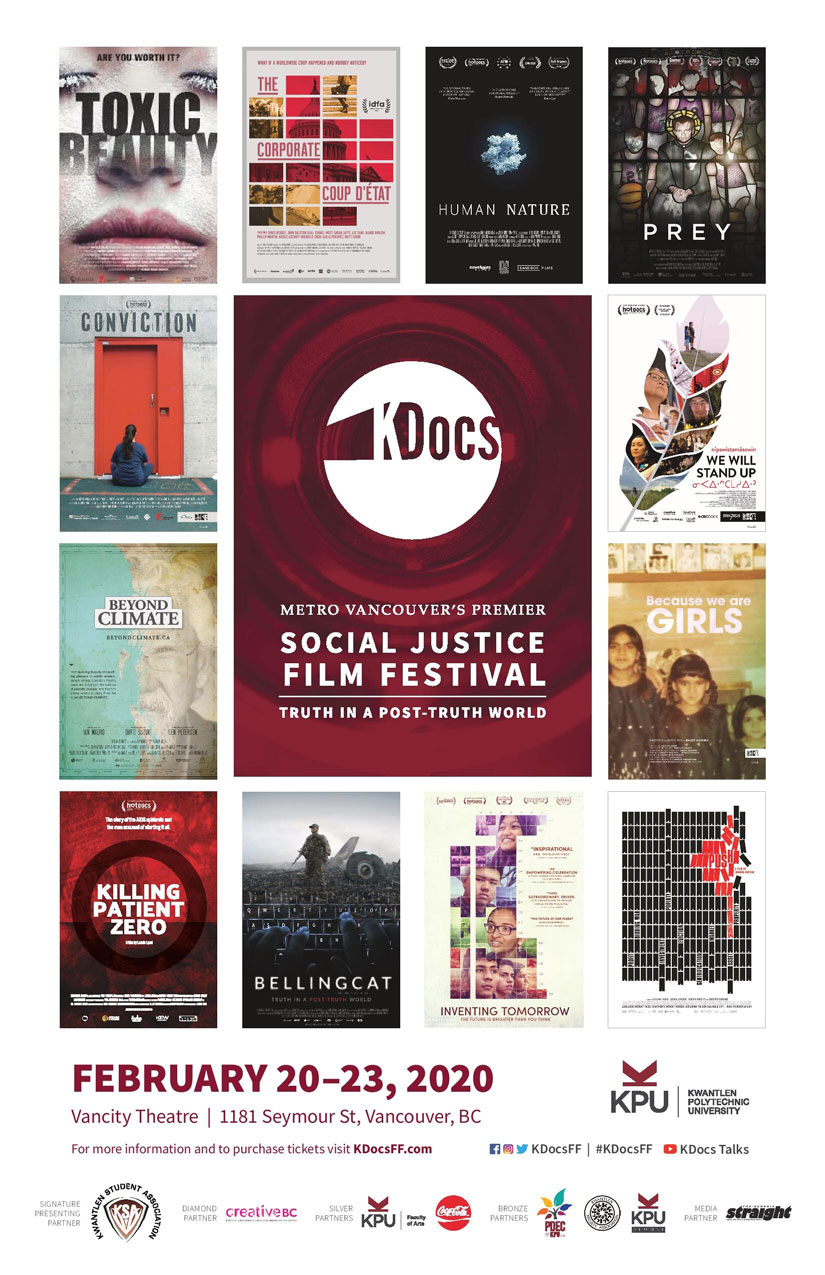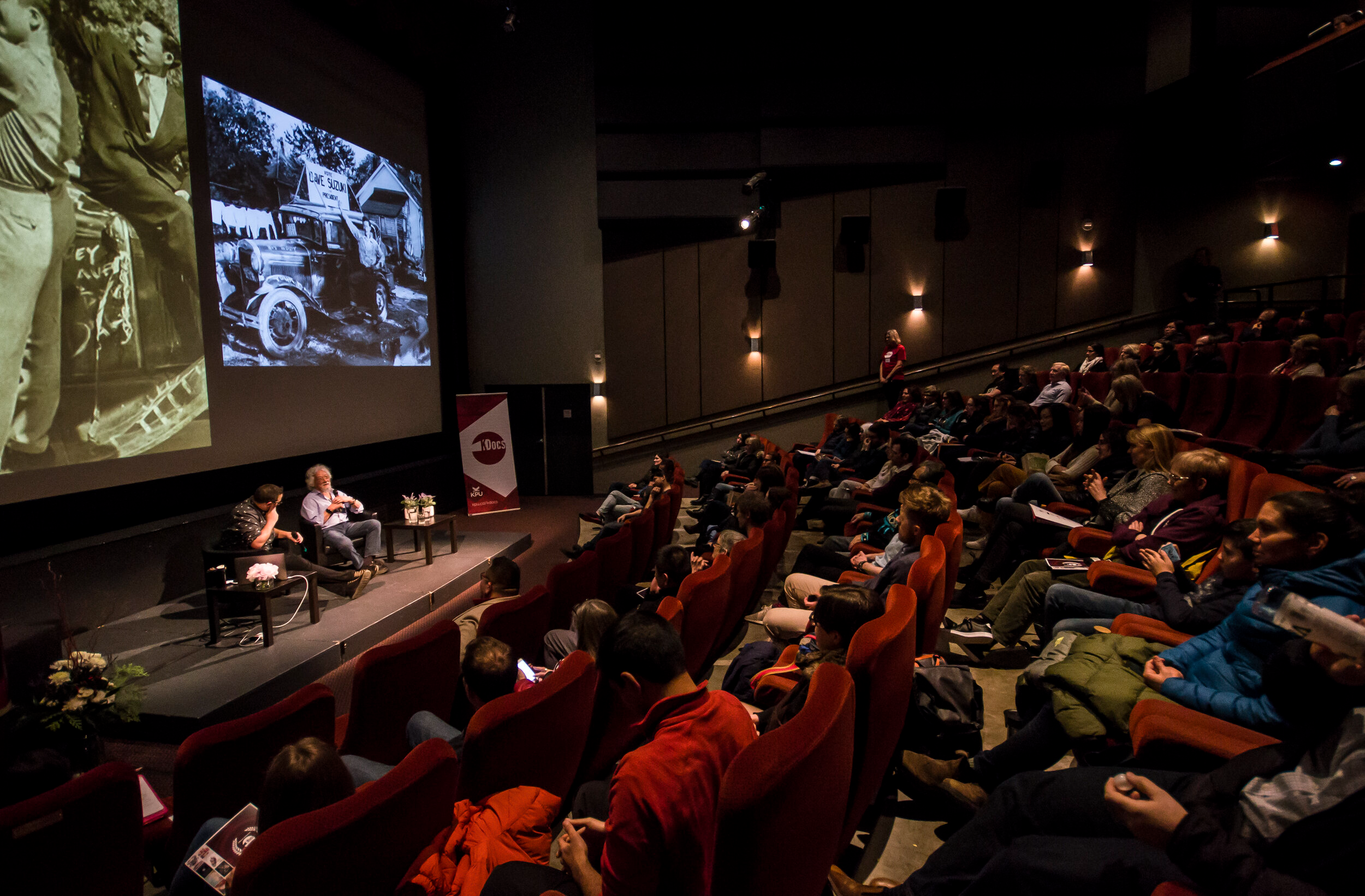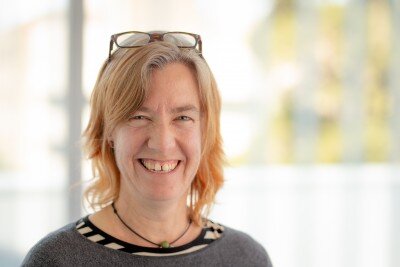
2020 FestivalTRUTH in a POST-TRUTH WORLD.
POSTER

An examination of the evolving nature of veracity in our society.
KDocsFF held its sixth annual documentary film festival on February 20-23, 2020, at the Vancouver International Film Centre/Vancity Theatre. Over 2100 people and 36 exhibitors were in attendance throughout the four-day festival—our biggest audience yet!
Courtesy of Kwantlen’s Library, you can read a bibliographic listing of additional resources for the KDocsFF 2020 films.
OUR FILMS 2020 Films
A conservative Indo-Canadian family in small-town British Columbia must come to terms with a devastating secret: three sisters were sexually abused by an older relative beginning in their childhood years. After remaining silent for nearly two and a half decades, the sisters decide to come forward—not only to protect other young relatives, but to set an example for their daughters as well. Documentarian Baljit Sangra sensitively explores the impact of sexual abuse on a family, turning her empathetic lens on intimate moments in the family’s life. Full of nuance and layers, Because We Are Girls weaves poetically between past and present, darkness and light. We witness the emotional toll that pursuing justice through the courts and confronting their family for not protecting them as children takes on the sisters. But we also share in their happiness as they bond with their daughters and dance along to their favourite Bollywood songs. As the film deftly intertwines touching home footage of the young, innocent girls they once were alongside uplifting scenes of the strong, empowered women they have become, the family’s unconditional love flows freely through it all. Straying from typical portraits of the journey to healing, Because We Are Girls offers a unique and powerful tribute to women’s strength in the face of profound trauma.
Bellingcat: Truth in a Post-truth World follows the revolutionary rise of the ‘citizen investigative journalist’ collective known as Bellingcat, a group of online researchers dedicated to exposing the truth of impenetrable news stories from around the world0—from the MH17 disaster to the Syrian Civil War to the mysterious poisoning of a Russian spy in the United Kingdom. From his Leicester home, de facto leader Eliot and his team of truth-seekers put newspapers, networks and governments to the test. Bellingcat uses cutting-edge digital techniques and crowdsourcing to create a faster, more innovative approach than traditional research journalism. For the first time, Bellingcat researchers in Germany, the Netherlands, Finland, and the United States have given exclusive access to filmmaker Hans Pool, allowing him to follow the group on their path to demonstrate the power of open source investigation. Bellingcat’s impact is examined through the lens of their current investigations, as well as the high-profile conflicts they’ve previously reported. In the three years since its inception, Bellingcat has produced a remarkable amount of breaking news while gaining a reputation for trailblazing journalism. When the International Criminal Court issued a landmark arrest warrant based on social media evidence, it was Bellingcat that proceeded to work on the case. Just last year, Dutch member Christiaan Triebert was awarded the European Press Prize for innovative journalism for his reporting on the failed Turkish coup. In a web of propaganda disguised as truth, what drives Bellingcat forward? With governments growing less reliable by the day and traditional newspapers declining in both relevance and reach, how does Bellingcat, dismissed by some critics as an assortment of self-funded ‘armchair researchers,’ have the ability to force powerful world leaders to the international courts where they are held accountable for their crimes? What does their success say about how our world has changed in the face of this century’s paradigm shifting developments in government, technology and social media?
The UN’s Intergovernmental Panel on Climate Change (IPCC) recent report, entitled Global Warming of 1.5°C, indicates that it is possible to stabilize the climate provided we act within the next decade to be globally carbon neutral by 2050. Indeed, having already warmed by 1°C already—since pre-industrial times—we are already seeing the impacts, especially in Canada. British Columbia—Canada’s most westerly Province along the Pacific coast—is a hotspot to visualize and experience how global warming affects local environments and communities. Through heat waves, droughts, melting glaciers, pest outbreaks, back-to-back record setting forest fires, and changes to the oceans, Beyond Climate takes viewers beyond the headlines and into the heart of the issues. The film holistically connects the larger patterns of climate change with the human dimension and what it looks like across BC from the top of the mountains to the depths of the oceans. Shot throughout the province over many years, the collective wisdom and perspectives of Indigenous leaders, local communities, scientists, and policymakers are featured. Dr. David Suzuki—renowned scientist, broadcaster and environmentalist—helps guide the journey as the narrator of the film. But Suzuki is more than just narrator. He’s a long-term resident of BC, having lived most of his life in Vancouver, and this film is part of his enduring legacy. Now, in his 80s, Suzuki reflects back on his life, how his home province is changing, and offers his personal perspectives on the environment, economy, and opportunity to navigate our complex future if we ‘pull back and give nature a chance.’ Addressing many of the pressing issues facing BC—from pipelines, liquified natural gas, salmon, and Indigenous rights—the film is a timely contribution to the province and country as we grapple with climate change, the paramount issue of our time.
Alarmed by the rising numbers of women in prison and inspired by the conviction of Senator Kim Pate, Conviction flips the narrative away from pop culture’s voyeuristic lens and hands it to the women who are being victimized, marginalized, and criminalized in our society. Not another ‘broken prison’ film, Conviction is a ‘broken society’ film—an ambitious and inspired re-build of our community, from the inside out. With more women in prisons than ever before, the film implicates viewers to question the status quo and to consider a different kind of society that better supports the most vulnerable among us. Conviction’s approach aims to collapse the ‘us’ and the ‘them,’ the filmmaker and the subject, the viewer and the women in prison. The women involved are true collaborators, not only in the process of creating their different versions of a better society, but also by participating in the making of the film. Conventional documentary roles of director, crew, interviewer, and subjects are blurred as the women become empowered to develop their ideas, experiment with all aspects of filmmaking, and celebrate their own voices. Their creative agency becomes a powerful force, encouraging them to chart the course of their own lives. This collaborative process is at the heart of our vision and drives our process as filmmakers, the film’s point of view, the content, and the creative style of the documentary.
From executive producer Dan Rather and director Adam Bolt, the co-writer and editor of the Oscar-winning film Inside Job, comes the story of the biggest tech revolution of the 21st century. And it isn’t digital. It’s biological. A breakthrough called CRISPR has given us unprecedented control over the basic building blocks of life. It opens the door to curing diseases, reshaping the biosphere, and designing our own children. Human Nature is a provocative exploration of CRISPR’s far-reaching implications, through the eyes of the scientists who discovered it, the families it’s affecting, and the bioengineers who are testing its limits. How will this new power change our relationship with nature? What will it mean for human evolution? To begin to answer these questions, we must look back billions of years and peer into an uncertain future.
Inventing Tomorrow follows six young scientists from Indonesia, Hawaii, India, and Mexico as they tackle some of the most complex environmental issues facing humanity today—right in their own backyards. Each student is preparing original scientific research that he or she will defend at ISEF, the Intel International Science and Engineering Fair. Framed against the backdrop of the severe environmental threats we now face, we immerse the audience in a global view of the planetary crisis, through the eyes of the generation that will be affected by it most. Considered the Olympics of high school science fairs, ISEF is the largest gathering of high school scientists in the world, attracting approximately 1,800 finalists from over 75 countries, regions, and territories. All the finalists want to do a good job, but the heart of the story isn’t about whether they go home with an award. As they take water samples from contaminated lakes, dig up the dirt in public parks, board illegal pirate mining ships, and test their experiments in a lab, we see each student display a tenacious curiosity and a determination to build a better future. Motivated by the desire to protect their homes, these young people ask questions about the issues they observe in their communities and propose innovative solutions to fix them. The students spend close to 600 hours each on their projects, guided in their scientific quest by dedicated university mentors. At home with their parents, grandparents, and siblings, they compare the world their elders knew with the stark reality of the one they’re inheriting.
1981, North America: it’s a mere seven years since homosexuality has officially been de-classified as a mental illness by the American Psychiatric Association, and it’s three years since the assassination of Harvey Milk. Yet, there is progress and a feeling of gay liberation in the air: sexuality shamed for centuries, millennia, is finally able to flex its muscles and celebrate itself. But these halcyon days lasted only a few years because, suddenly, a deadly new disease was killing gay men. Initially called the ‘gay plague,’ this syndrome would become a shocking illustration of the entrenched homophobia of the time—literally thousands of gay men would die before the mainstream media, or governments, paid proper attention to—and spent resources on—the disease. Killing Patient Zero explores this gay holocaust by telling the story of Gaetan Dugas, notoriously (and erroneously) known as ‘patient zero,’ thanks to Randy Shilts’ ground-breaking 1987 book on the AIDS epidemic, And The Band Played On. In Shilts’ work, Dugas comes across as a psychopath, willfully infecting other gay men. By exploring how Dugas’ infamy came about, Killing Patient Zero is also be a psychological portrait of the gay women and men of this era—clarifying both how they coped and the insidious ways in which homophobia—both external and internal—challenged all homosexuals of this generation and, indeed, continues to do so now. Unlike many gay men in the 1970s, however, Quebecois flight attendant Dugas was openly and unashamedly gay. He was also one of the first 57 AIDS cases reported to the Center for Disease Control (the CDC) in Atlanta. Unlike the other men on their radar, Dugas was able to provide the names of 72 of his former sex partners—and, in so doing, landed in the middle of the CDC’s famous Cluster Study, where, as Patient O (as in the letter, ‘O,’ for ‘Out of California’), he was soon incorrectly referred to as ‘Patient Zero.’ The legacy of the patient zero story cannot be overestimated. It reinforced the negative stereotype of a white, promiscuous, oversexed gay man, who is often still cited as an example of a sociopath. Based on Richard McKay’s ground-breaking book, Patient Zero and the Making of the AIDS Epidemic, this feature documentary clears Dugas of being anything other than a highly sexually active gay man, someone who—like hundreds of other gay men—refused to be re-pathologized by the scientists and doctors of the time.
On a summer day in 2016, a young Indigenous man named Colten Boushie died from a gunshot to the head after entering Gerald Stanley’s rural property with his friends. The emotionally charged trial and ultimate acquittal of Stanley caused shock and outrage across Canada, shattering the shaky confidence that Colten’s family had placed in the justice system. Award-winning filmmaker Tasha Hubbard follows the trial and its aftermath, revealing questions about bias that became apparent following the RCMP investigation and jury-selection process. Hubbard traces the long history of violence against Indigenous people and their erasure from the systems of law and power, to the present day, exposing the need for systemic changes. Emerging from the tragedy are the powerful and resilient voices of Colten’s family and community, who stand up for a better future for the next generations. Taking strength in the memory of their beloved son, brother and cousin, the family embarks on a search for justice that brings them to the country’s highest echelons of power and ultimately to the United Nations, where they challenge Canada’s justice system in front of the international community. Hubbard, whose previous films with the National Film Board of Canada have delved into forced Indigenous family separations during the Sixties Scoop (Birth of a Family) and the alleged involvement of Saskatoon police in the infamous freezing deaths of Indigenous men (Two Worlds Colliding), steps in front of the camera for the first time in a desire to highlight the personal toll the case has taken on the lives of Indigenous people. nîpawistamâsowin: We Will Stand Up weaves a profound narrative encompassing the filmmaker’s own adoption, the stark history of colonialism on the Prairies, and a vision of a future where Indigenous children can live safely on their homelands.
Most civil, clergy sex abuse cases are settled quietly, out-of-court and far from public view. But Prey follows one survivor and his lawyer as they pursue justice through a public trial in the hopes of forcing the dark and hidden story of clergy sexual abuse to light—a local story with global resonance. Rod MacLeod, the plaintiff in the case, was abused for years as a boy 50 years ago at the hands of a Catholic priest. Rod is represented by Rob Talach, a civil lawyer who has filed 395 suits against the Church, earning him the nickname ‘The Priest Hunter.’ The defendants are The Basilians of Toronto. Attending trial as their representative is Father David Katulski, the public face of the Catholic religious order. The abuser, Father Hod Marshall, makes his presence known at the civil trial in the form of a haunting video deposition taken before his death. The video had been sealed from public view until now. This trial was not about guilt or innocence, but about how much money the church should pay in compensation for the devastating fallout from the abuse. More importantly for Rod, it was about exposing the truth of how and why the sexual abuse of children could go on for so long without the Church stopping it. Prey documents the courtroom drama and delves into the personal stories of many of those present.
Push is a new documentary from award-winning director Fredrik Gertten, investigating why we can’t afford to live in our own cities anymore. Housing is a fundamental human right, a pre-condition to a safe and healthy life. But, in cities all around the world, having a place to live is becoming more and more difficult. Who are the players, and what are the factors that make housing one of today’s most pressing world issues? In Harlem, New York, we meet a man who spends 90% of his income on a flat. Soon, the two-bedroom will cost $3600USD per month. His 1,700-unit housing project has just been bought by a huge private equity fund. In Barcelona, Ahmed and his family are the last left in their building where all other apartments are sealed off. The new owner has been pushing all of their neighbours out. In London, people talk about ‘bank boxes in the sky,’ new condo buildings and flats sold on international fairs as investment pieces. Now, many apartments in these shiny new buildings stand empty. Enter Leilani Farha of Ottawa, Canada. She has just sent her kids off to school when she receives an email with a startling graph. It shows the extreme difference between housing prices and wage development over a 20-year period. In the Greater Toronto Area, housing prices have increased at three times the rate of income. With a background in advocacy for the homeless, Leilani has for the past three years been the UN Special Rapporteur on the Right to Adequate Housing, with the right to hold governments accountable if they don’t meet the human rights obligations in the UN Human Rights Charter. She believes that, if we really want to make change to ensure people can live in the city—all people: rich, middle, and poor; brown, black and white; young and old—then we have to be able to hold someone responsible for what is going on. She wants to confront the very idea of what the experts call the ‘financialisation’ of the housing market. ‘There’s a huge difference between housing as a commodity and gold as a commodity.’ Push follows Leilani’s quest to understand the radical change that cities all over the world are now being confronted with.
A democracy should protect its citizens, especially the most vulnerable among them, but increasingly the United States is failing to do so. This investigative and persuasive documentary blends the insights of philosophers, authors, and journalists with the experiences of citizens of the Rust Belt in the US Midwest, where the steel industry once flourished, but where closures and outsourcing have left urban areas desolate and hopeless. It’s here that Donald Trump finds some of his most fervent supporters, as he’s not considered part of the hated Washington establishment. Journalist Chris Hedges argues that the crisis predates Donald Trump’s election by many years. Like his source of inspiration, the Canadian philosopher John Ralston Saul, Hedges regards Trump as the symptom rather than the disease. Decades ago, U.S. democracy began selling its soul to big corporations. Lobbyists and corporatism took control in Washington, gradually undermining the will of the people. Journalist Naomi Klein recently described Trump’s administration as a ‘corporate coup d’état.’ Hedges and Ralston Saul argue that the real coup took place long before.
In 1982, world renowned epidemiologist Dr. Daniel Cramer linked Johnson & Johnson’s baby powder to ovarian cancer. Since the 1960s, J&J allegedly knew the risks and did nothing. In 2004, Dr. Philippa Darbre, a UK scientist, found parabens, a chemical preservative in many cosmetics, in breast tissue. In 2018, the National Institute of Health’s sister study linked breast cancer to personal care product use. From links to hormonal disruption in baby boys, to developmental delays, low sperm count in men, infertility, cancer, diabetes, obesity, and skin disease—the cosmetic industry isn’t pretty. Each morning, we slather with 1000s of chemicals, many of which are proven to be toxic. In the United States, the Cosmetic and Personal Care Industry regulates itself. In Canada, implementing regulations is under scrutiny. There is doubt propagated by big industries making claims that we have nothing to worry about, positioning themselves as champions of personal empowerment through their multibillion-dollar advertising campaigns. Top researchers worldwide have the hard science to answer the question ‘Are cosmetics and personal care products a public health risk?’ Toxic Beauty is a film with exclusive access to scientists, lawyers, advocates, regulators, politicians, a dynamic whistleblower, survivors, and women who have lost their lives. It follows the class action lawsuit against J&J and the plaintiffs, sharing personal stories of women fighting for justice in a race against time with this deadly disease. Woven throughout the film is a human experiment. [Toxic Beauty] documents Boston University medical student, Mymy Nguyen, [as she] measures her chemical body burden from over 27 products. Scientists monitor her shocking results. In the end, the film meets the companies and people who offer solutions and optimism for safer, toxicant free cosmetics.

2020 FILMSWant to watch panel talks and more content?

WORD ON THE STREET
I attended KDocsFF in February 2020 with my film, Conviction. I’m one of the co-directors of the film, and I’m also producing and facilitating the film’s impact campaign.
I was invited as a special guest, a panellist, and an exhibitor. Attending KDocsFF benefitted us greatly, as we were able to connect and network with a variety of stakeholders–individuals and groups who are involved in issues central to the film. We’ve been working with Good Pitch Vancouver on our impact campaign, and participating as a panellist and exhibitor was crucial to networking and building relationships with other impact partners. We were also able to mobilize audience members to support our letter writing campaign and write and send letters in support of two bills that [Canadian] Senator Kim Pate was tabling. As Kim was also in attendance [as keynote speaker and panelist], this was a great opportunity to connect her with audience members who want to participate in making change. Unlike most film festivals, at KDocsFF, direct engagement, dialogue, and community-building are just as important as film screenings. [Also,] their Year-round Program and Community Outreach Programs offer open-access events, workshops, and opportunities for everyone to embrace the world of documentary film and filmmaking. As a filmmaker, these exchanges are vital to the success of our industry. Supporting KDocsFF means supporting not only its social justice-driven mission and vision, but also BC’s film, interactive digital, music, and publishing industries, and the critically important collaborative frameworks and models that ignite true, ongoing partnerships industry-wide.”
Ariella PahlkeCo-director, Conviction and Special Guest, Panelist, and Exhibitor, KDocsFF 2020
Shape Change with Us
How Can You Contribute?
Your involvement as a partner goes beyond mere support — it’s an opportunity to be at the forefront of driving social change through film. Join us in this transformative journey.
Why Partner with Us?
Your support fuels our mission, enabling us to bring you thought-provoking documentaries and engage wider communities in meaningful dialogues. Together, we can amplify the impact of social justice narratives.

